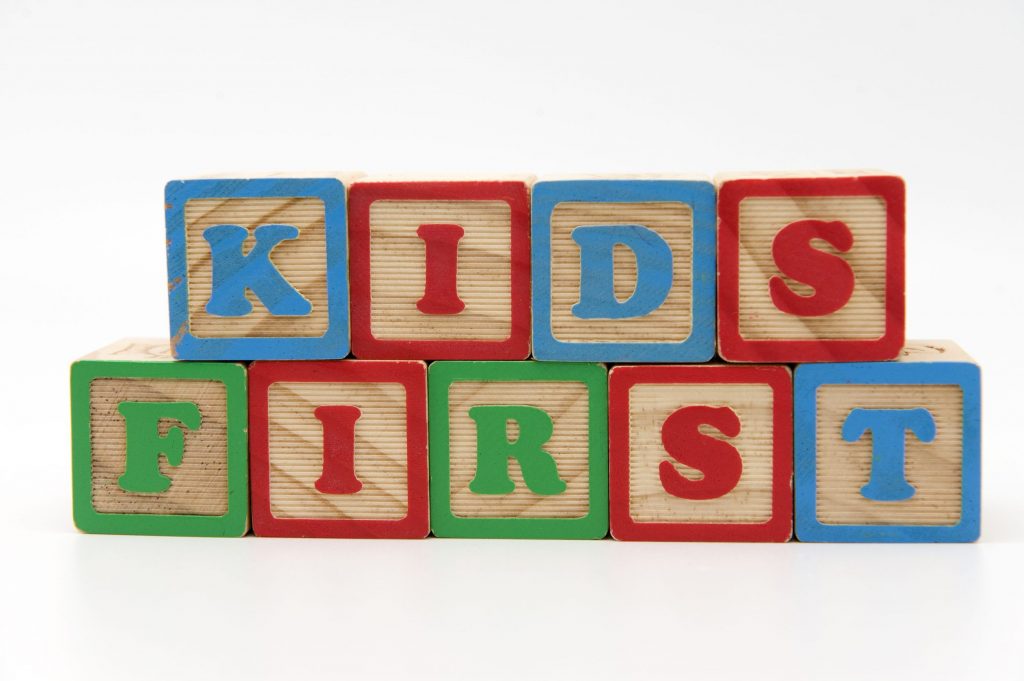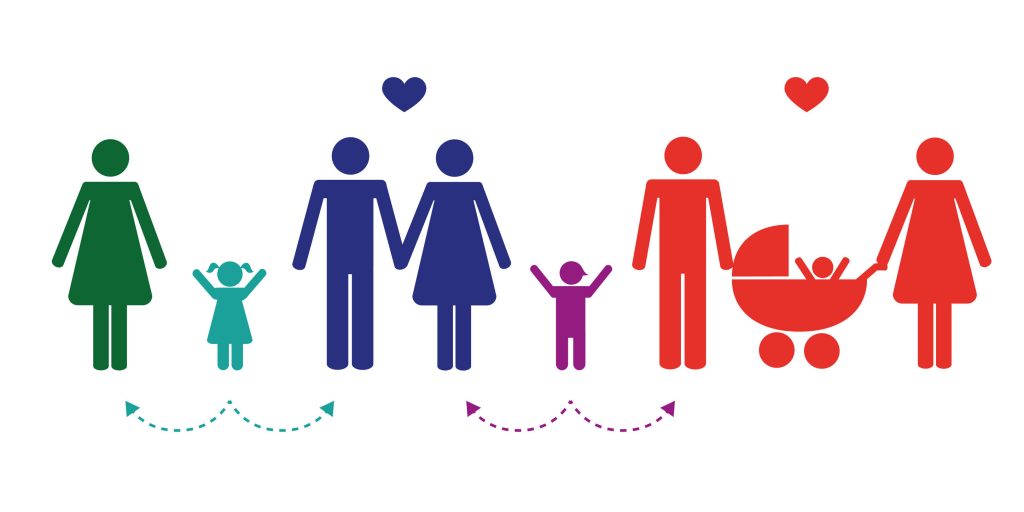The holidays are a time for family togetherness, for creating and following traditions. In the past, you might have created family memories from these traditions to last a lifetime, making the holidays something you and the children look forward to. But now? Now your family has split, which means you’re going to need new traditions. The children might be resistant to new traditions since both of their parents can’t be involved like they were before. For this reason and many others, you might even dread the holidays.
So, what happens when your family doesn’t exactly look like one on a Hallmark card? What happens if you have a blended, separated or divorced family? Celebrating the holidays under these circumstances can be challenging. While it won’t always be easy, it’s important to provide a stable environment for the children of divided families. We’ve called in our resident experts for help.
Who are our experts? Mrs. Edidiong Aaron, the founder of Family Matters Law Group, is a family law attorney specializing in father’s rights, divorce, custody and legitimation. Dr. Raushannah Johnson-Verwayne, aka Dr. RJ, is a licensed psychologist and the founder of Standard of Care Psychological Services in Atlanta. She earned her doctorate in clinical psychology from the Georgia School of Professional Psychology and specializes in psychological assessments and trauma-informed treatments.
In this segment with Mrs. Edidiong Aaron and Dr. Johnson, we explore the challenges surrounding newly divorced or separated families, blended families and single parents during the holiday season and how they can be safely navigated. We’ll address issues of co-parenting, parenting time and child transfers around the holidays, keeping in mind what’s most important: What would make the holidays smooth sailing for the kids?

One of the biggest questions we hear around the holidays pertains to custody. Who gets the kids, and when? When should divorced or separated parents begin to plan custody arrangements for the holidays? How does the holiday schedule impact the regular agreed-upon visitation schedule?
Holiday Schedules
In Georgia, a holiday schedule is not just a verbal or written agreement you make with your former spouse before each holiday to divide parenting time. It’s actually a court order that is typically decided when a custody agreement is made. According to Mrs. Aaron, “Divorced parents typically already have a holiday schedule spelled out in what Georgia courts call a parenting plan. The parenting plan is incredibly detailed and outlines the dates and times for exercising the holiday schedule and who is responsible for transportation.”
This parenting plan is responsible for providing structure for newly divorced and separated families. This means that a plan is laid out for custody, parenting time — even contact. According to Mrs. Aaron, “The parenting plan even includes reasonable phone calls and contact with the other parent while the children are away for the holiday. Parents that have separated should try to plan a year in advance or create a schedule similar to a parenting plan that they can easily reference and follow.”
Additionally, it should be noted that in the state of Georgia, holiday schedules take precedence over the regular parenting schedule. Once the holiday concludes, the regular schedule resumes as normal. Holiday schedules have their own guidelines that depend on how many days the holiday is celebrated. Thus, holiday visits take place outside the norm of regular visitation schedules and don’t follow the parameters laid down by the regular schedule. As a result, one year a parent may have more parenting time than normal, and the next year, the other parent may have more time.

Another common question relates to whether or not divorced or separated parents are guaranteed time with their children over the holidays. For this, parents should pay close attention to the court order that mandates their custody and parenting time.
According to Mrs. Aaron, if a couple is divorced, their holiday parenting time is outlined in the parenting plan and must be honored because it is a court Order. Parents who are merely separated have no such legal bonds, because there is no order in place. Holiday parenting time is not guaranteed in separation because the law is not enforcing any agreement about how the time should be spent. Still, separated parents should make a holiday parenting plan to ensure that each parent has an active involvement in the child’s life.
Special Considerations for Holiday Parenting Time
The only time that a parenting plan might prohibit parenting time, including holiday time, is if there are concerns about the welfare and safety of the child. If there has been any violence or the child has been placed in harm’s way, a parent can lose their parenting time.
Additionally, the courts will not force a parent to exercise their parenting time if they do not wish to. This means that divorced or separated parents do not have a legal responsibility to be present during the holidays. The court doesn’t want to place the children in an environment where they are not wanted or welcomed.
Divorced or separated parents do not typically spend holidays with one another. If one parent attempts to prevent the other parent from exercising their holiday parenting time, there is action you can take. If you are a divorced or separated parent and have a parenting plan in place and this occurs, you should immediately file for contempt.
Do not call the police and tell them that one parent refuses to honor the previously agreed upon schedule. They will promptly tell you that they don’t get involved in domestic issues and that you need to file an action with the court.
A child not wanting to go to a particular parent’s house for the holidays can make for a difficult situation. The remedy for this largely depends on the age of the child. If a child is under the age of 14, they do not have the right or authority to decide whether they want to visit the other parent’s home, assuming there are no issues involving threat or harm to the children. If the child is age 14 and above, a good parenting plan should address the understanding that the child is a growing teenager and has the ability to determine whether they want to exercise their time with a particular parent.

Mrs. Aaron recommends that older children (i.e., high school age) should be given more autonomy overall. In caring for teenagers, a successful co-parenting relationship is so important. Being able to communicate successfully with your ex regarding your high schooler’s need for autonomy and flexibility will make transitions easier.
Children of all ages should be encouraged to express their feelings and also learn to make the best out of situations in a manner that is consistent with their age. Be sure to ask in detail why they don’t want to go to a particular parent’s house. If you suspect abuse, contact a professional. Sometimes a child’s reasoning for no longer wishing to visit with the other parent may be driven by their desires to spend time with their friends, classmates or teammates. Get down to the bottom of whatever the reason is and handle it appropriately.

The New Normal

Children are resilient and follow the lead of their parents. Try to prevent stress by establishing reasonable expectations and de-escalating situations right from the start. It might seem overwhelming, but there are a few things you can do to ensure an easier transition for yourself, your ex and the children.
Remember to validate the children’s feelings following a divorce by using true, but not dismissive, statements. Here’s an example from Dr. Johnson: “Tim, I know you feel sad about us not being together for the holidays. It’s a tough adjustment and it probably feels unfair.”
Reinforce the idea of a “new normal.” At the same time, it’s important to let them know that the “new normal” may be different, but that doesn’t mean it’s going to be bad. Ask them if they have any ideas for new holiday traditions. It’s OK to do a little extra to make them feel comfortable without giving them the notion that things are going to return to the “old normal.”

Avoiding stress over the holidays is difficult for many people already, but it can be especially challenging for families who have separated. The children will be especially sensitive to stress during this time, so it’s important to create a safe atmosphere for them. According to Dr. Johnson, “The holidays are stressful when the adults are unable to create a safe and predictable atmosphere. The key is to eliminate animosity and to speak positively of the other parent. Be mindful of nonverbal behaviors.” In other words, don’t roll your eyes, make faces or use threatening gestures.
It’s reasonable to expect that many children might misread some holiday activities and think their family is getting back together. For example, if both parents sit together at their child’s school play, the child might misunderstand that the parents have reconciled. Some activities can create an emotional connection that cannot be sustained once the holidays are over. It’s extremely important for you, as a parent, to maintain reasonable expectations with children at this time.
It’s also crucial to balance children’s expectations with reality. Dr. Johnson recommends the following:
“It is always a good idea to communicate on a regular basis. Talk to the child about what they might be feeling. Don’t be afraid to take a middle-ground stance with your child. For example, ‘Your father and I enjoy spending time with you during the holiday and we’re not getting back together. This is our new normal.’” The use of these “and” statements helps children accept and merge two opposing ideas.
The best approach when creating a new normal is make your plans and expectations clear, and set rules, boundaries, consequences and rewards ahead of time to ease transitions. Children act out when there’s a lack of consistency and structure. Keep it simple and age appropriate. Consistency counts!

Custody and Other Holiday Arrangements
Divorced and separated parents may also wonder if splitting up multiple children for the holiday should ever be considered. This is not something Mrs. Aaron personally recommends.
“I don’t believe this is ever a good idea. Children should be allowed to continually exercise healthy and loving relationships with their siblings, especially during times of the year that are geared directly towards family unity and togetherness.”
Dr. Johnson adds, “My professional opinion is that siblings should be together. Splitting them up can cause additional feelings of isolation. However, every family is unique. This could work in some situations.”
There is no one ideal arrangement for the children over the holidays, except that the arrangement should be planned in advanced so the child is prepared for what is to come. There is no “one size fits all” when it comes to making a parenting plan. Typically, parents will alternate holidays. For example, if one parent has the children on Thanksgiving, the other parent will have the children for the first half of Christmas break (the day and time school recesses until Dec. 26 at 3 p.m.). Or, if one parent has spring break in even years, the other parent will have spring break in odd years.

You will also need to plan accordingly for practical arrangements, such as who sleeps where, time with friends, preplanned activities that the child would be upset to miss (e.g., caroling with Girl Scouts) and how the children will be transported. If the holiday is Christmas, will the parents choose to exchange the children on the day of Christmas so that both parents get the opportunity to open gifts with the children? This planning includes designating the time frames in which the other parent will be able to speak with the child when they are away, taking into consideration that because it is a holiday, the children may be actively involved in activities and away from the phone.

You may also wonder what a reasonable expectation of parenting time for divorced and separated parents over the holiday might be. The answer is that it depends on the age of the child, the length of the holiday and whether the parents wish to split the holiday in half or have the entire holiday to themselves in alternating years. Children under the age of two are generally impacted negatively by not having contact with the mother for an extended period of time. Ideally, children should be able to speak to the other parent on the phone or via video call on a daily basis, if desired.
Making the Best of a Difficult Situation
The negative impact of holiday conflict (in fact, any conflict) can cause social, emotional and educational problems, and the memories are long-lasting. Think about how many adults still have strong feelings about their parents’ separation or divorce, and then apply it to your own children.
Parents should consider the psychological consequences on the child if a parent refuses to participate in holiday planning. Remember that planning ahead is in the best interest of the children. Refusing to participate or cooperate creates conflict that negatively impacts children.
Are there any legal consequences for lack of participation? The legal ramifications are not contemptuous, as the court will not force a child to visit a parent who refuses to participate. However, the other parent may have grounds to modify the parenting plan to exclude the unwilling parent from any future holiday visits. Again, the goal of the court is to do what’s best for the children.

When it comes to money and gifting during holidays, tensions can run high. How should divorced or separated parents address spending during the holidays? If parents are arguing over alimony or child support, this is an important question.
Some parents feel uncomfortable when one parent can afford to provide more gifts or more expensive gifts than another. What can you do if your ex can outspend you on presents? It is Dr. Johnson’s opinion that the dollar amount spent matters less to children than memories and time spent does:
“This is a ‘values’ question. Spending money on children doesn’t mean anything to them in the long run. They want time, opportunities to make fun memories, and affection.”
Sometimes, even after months of planning and accommodating, one parent might decide not to stick to the original plan. It’s especially important to be flexible and stay calm, especially in front of the children.
Special Considerations
When it comes to grandparents, if the grandparent was actually awarded grandparent visitation rights by the court, they may be entitled to exercise holiday parenting time. However, we rarely see a court award a grandparent holiday parenting time, as the state of Georgia holds a parent’s constitutional right to access and control of their own children to a higher standard than the right of a grandparent.
Additionally, if divorced or separated parents are now currently living an alternative lifestyle (e.g., they have come out as gay or transgender), their visitation privileges may be denied in cases of suspected or proven abuse, but not due to the alternative lifestyle.

If one parent has a criminal record, it’s important to remember that criminal records can be subjective. If there is a charge related to abuse or violence against children, or if there is current criminal activity, restrictions usually apply and are decided by the court.
Setting a Good Example
Overall, children are resilient. They look to the adults in their lives as role models. If the adults are cordial, respectful and decent to one another, the children will feel safe and adjust well. If the adults use the child as a pawn, are disrespectful to each other, or if they speak negatively of each other in front of the child, the child will be negatively impacted. It is imperative for parents to understand how their behaviors affect their children. Healing and adjustment take time, and during this time period, children need more attention from their parents.

After the holidays, you should plan to spend time de-stressing with the children before regular activities resume. Taking time to gauge their thoughts and emotions after the “firsts” of their new normal will help them adjust. This also serves to help them understand that, even if there is a period of adjustment, they can still enjoy themselves and their changing family.
This will go a long way in getting them ready to go back to school, as well as resume a regular visitation schedule with the other parent. Parents should also pay attention to any major changes in their child’s attitude and behavior, and seek help from a professional, such as a therapist. Meeting with a therapist will give the child a place to express feelings safely if they do not feel like they can share their thoughts and fears with their parents just yet.
Over time, your hurting family will heal and change. Holiday parenting times will reflect those changes. In the future, the shape of either parent’s family may change and become blended. Stepparents may become part of the picture, and stepbrothers and stepsisters as well. When that time comes, parents may also benefit from discussing the positives of a blended family. For adjusting to a blended family, Dr. Johnson recommends the book, “Mom’s House, Dad’s House for Kids” by Isolina Ricci, Ph.D.
Getting Help for Your Family
If you are a parent in the metro Atlanta area, including Henry, Clayton, Fayette and Fulton counties, and you need assistance with custody and the development of a child-focused holiday parenting plan, please don’t hesitate to contact the office at Family Matters Law Group. We’re committed to being a strong ally for parents whose children, assets and money are under attack.



